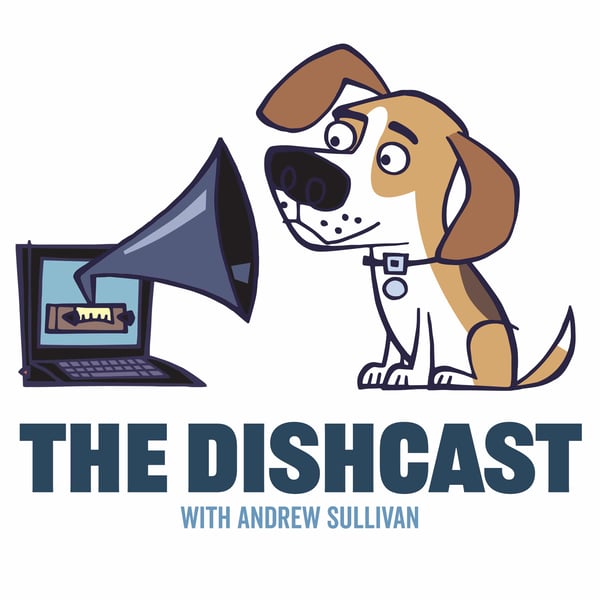Robert Merry On McKinley, Tariffs, Conservatism
The Dishcast with Andrew Sullivan
Andrew Sullivan
4.6 • 836 Ratings
🗓️ 6 June 2025
⏱️ 48 minutes
🧾️ Download transcript
Summary
Robert is a journalist and historian. He served as president and editor-in-chief of Congressional Quarterly, the editor of The National Interest, and the editor of The American Conservative, and he covered Washington as a reporter for the WSJ for more than a decade. He has written many history books, including the one we're discussing this week: President McKinley: Architect of the American Century. It’s a lively read, a fascinating glimpse of fin-de-siècle American politics, and of a GOP firmer on tariffs — but a hell of a lot more virtuous than it is under Trump today.
For two clips of our convo — on McKinley’s heroism during the Civil War, and the reasons he differs so much from Trump — head to our YouTube page.
Other topics: Robert’s journalist dad and his conservative influence; his own career as a journo; McKinley’s roots in Ohio; his abolitionist parents; his mentor Rutherford B Hayes; his time in Congress; the economic depression of the 1890s; the debate over the gold standard; McKinley’s “front-porch strategy” besting the great populist orator William Jennings Bryan; his underrated presidency; his modesty and “commanding quiet”; his incremental pragmatism — in the spirit of Oakeshott’s “trimmer”; ushering in American empire; the Spanish-American War; the sinking of the Maine; taking over the Philippines; annexing Hawaii; leaving Cuba to the Cubans; the Panama Canal; McKinley’s strong support of tariffs; his later pivot towards reciprocity in trade; his lackluster record on race relations; his assassination by an anarchist; Teddy taking over; his bombast contrasting with his predecessor; trust-busting; McKinley’s remarkable marriage; his wife’s epilepsy; HW Bush; and if a McKinley type of conservative could succeed in today’s GOP.
Browse the Dishcast archive for an episode you might enjoy (the first 102 are free in their entirety — subscribe to get everything else). Coming up: Chris Matthews — who just revived “Hardball” on Substack, Tara Zahra on the revolt against globalization after WWI, Walter Isaacson on Ben Franklin, Arthur C. Brooks on the science of happiness, Paul Elie on crypto-religion in ‘80s pop culture, and Johann Hari coming back to turn the tables and interview me for the pod. Please send any guest recs, dissents, and other comments to [email protected].
Transcript
Click on a timestamp to play from that location
| 0:00.0 | The Hi there. Welcome to another dishcast from sunny Provincetown. It's warmed up a little bit. I'm excited. I finished the garden, which was an ordeal. It always is. I'm not here for like seven months and the place becomes crazy by the time I get here. But I've sorted it out. I've developed my massive allergies as a consequence, but I'm doing fine. I'm lucky to be alive and very lucky to be here. We have some great guests |
| 0:55.8 | coming up. We urge you to subscribe if you haven't already. We have some history. Tarazara is |
| 1:05.2 | coming on to talk about the anti-globalization wave between World War I and World War II and how that can reflect upon our current moment. |
| 1:15.9 | We have Walter Isaacson coming on to talk about Ben Franklin, just because I want to talk about some great Americans, as we're all a little down and depressed about the country. |
| 1:24.7 | Arthur Brooks is coming on to talk about the science of happiness. |
| 1:29.5 | Chris Matthews, |
| 1:37.1 | my old buddy and friend from the TV circuit, is coming on. We're going to talk about his life, his career in politics, and the media, and where we are. And Paul Eli has written this rather |
| 1:43.2 | beautiful book called The Last Supper, which is about |
| 1:45.7 | crypto-religious art, as he puts it, in the 1980s. It's a really interesting, a little book |
| 1:53.4 | and it's being reviewed right now, and Paul and I also go back a long way. He's a really wonderful and very Catholic writer. |
| 2:04.2 | But this week, we're doing something a little different. |
| 2:08.6 | I am interested in the man that both Karl Rove and Donald Trump has said is a model for them. |
| 2:16.4 | Obviously, they mean it in very different ways, but I never |
| 2:20.4 | really knew much about President McKinley. And he's an actually interesting character. And I thought |
| 2:27.4 | it would be interesting to think about how he emerged, what he did, what he represented in terms of America's shift towards the |
| 2:37.5 | world. I think of it in some way as the beginning of something that Trump is sort of maybe bringing |
| 2:43.5 | to an end. And no one better to talk to you about this than the author of the best biography |
| 2:49.9 | of him, President McKinley, |
| 2:51.4 | architect of the American century. Robert Mary, he's a journalist and a historian. He served as |
| 2:59.3 | president and editor-in-chief of the congressional quarterly, the editor of the national interest, |
| 3:04.4 | and editor of the American conservative. And he covered Washington |
| 3:07.8 | as a reporter for the Wall Street Journal for more than a decade. He's written many history books. |
... |
Please login to see the full transcript.
Disclaimer: The podcast and artwork embedded on this page are from Andrew Sullivan, and are the property of its owner and not affiliated with or endorsed by Tapesearch.
Generated transcripts are the property of Andrew Sullivan and are distributed freely under the Fair Use doctrine. Transcripts generated by Tapesearch are not guaranteed to be accurate.
Copyright © Tapesearch 2025.

